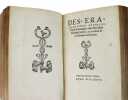ERASMUS, Desiderius, ERASME
Hyperaspistes diatribae adversus Servum arbitrium Martini Lutheri. [avec :] Hyperaspistae liber secundus.
Bâle, J. Froben, 1526 - 1527.
Reference : 17078
Premières éditions. Erasme avait publié le 'De libero arbitrio' en 1524 auquel Luther répondit par: 'De servo arbitrio' en 1525. Au début de 1526, Erasmus répondit à celui-ci par la première partie de son 'Hyperaspistes'. La deuxième partie a été publiée en septembre 1527. Poursuivant la controverse exégétique avec Luther, Erasme y attaque la position exagérée de Luther - dérivée de Paul - selon laquelle la loi n'apporte que la connaissance du péché et n'est donc pas vraiment destinée à être accomplie. La confrontation entre Érasme et Luther est un duel dune importance majeure pour lEurope de la première moitié du XVIe siècle, car ce sont deux visions de lhomme, de lhistoire et de la foi qui saffrontent. Cette oeuvre de controverse d'Erasme n'a pas connu le succès populaire de celle de Luther; elle est rare aujourd'hui. Très belle typographie des Froben. Très bon exemplaire. USTC 664563 et 635401. /// In-8 de (312) pp. / 575, (1) pp. Vélin à rabats, lacets d'attache. (Reliure du XVIIe.) //// First editions. Erasmus had published a tract 'De libero arbitrio' (On Free Will) in 1524 and Luther published his riposte 'De Servo Arbitrio' (On the bondage of the Will) in 1525. In early 1526, Erasmus replied to this work with the first part of his two-volume 'Hyperaspistes' (The Shield-bearer). In September 1527 the second part of 'Hyperaspistes' appeared, continuing the exegetical controversy with Luther. Erasmus "'now deliberately buttressed his position even more strongly with references to the church fathers. He particularly attacked Luther's allegedly exaggerated position - derived from Paul - that the law brings only the knowledge of sin and thus is not really intended to be fulfilled. While Luther had decided in favor of the Pauline position, Erasmus had smoothed out the controversial points in the biblical tradition with his combination of grace and free will." Brecht, Martin Luther. Shaping and Defining the Reformation. The confrontation between Erasmus and Luther is a duel of major importance for Europe in the first half of the 16th century, because they are two visions of man, of history and of faith which confront each other.This work of the controversy by Erasmus did not had the popular success of that of Luther; it is rare today. Very nice typography of Froben. Very good copy. /// PLUS DE PHOTOS SUR WWW.LATUDE.NET
Bookseller's contact details
Hugues de Latude
Hugues de Latude
B.P. 70046
31290 Villefranche de Lauragais
France
06 09 57 17 07
Payment mode



Sale conditions
Books are guaranteed to be complete and in good condition unless otherwise stated.
 Write to the booksellers
Write to the booksellers





